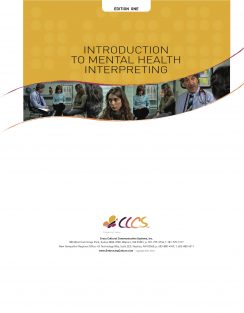A great majority of mental health encounters happen in primary care or in the emergency room. According to the Bazelton Center for Mental Health Law, 25% of all primary care encounters involve a diagnosable mental illness and 50% of mental health problems are still not being diagnosed properly. The World Health Organization is recommending that all medical providers “screen for mental health issues, assess and furnish care to those with mild or moderate disorders or whose severe mental health disorders are stable.”
So even if interpreters decide not to interpret in traditional mental health settings, they will certainly find themselves interpreting for patients with mental health issues. For example, in her
assessment of a patient with possible memory impairments, a family doctor may conduct memory testing through the interpreter. Or an ER doctor may see a patient presenting with suicidal ideation, one who is experiencing his first psychotic break, or one who suffers from substance abuse issues.In all of these situations, the interpreter will be practicing mental health interpretation.
Are you ready to interpret in mental health settings? When you think of the term “mental health,” what is your first reaction? How would you describe a person who suffers from a mental illness or disorder? Mental illness is prevalent in today’s society. According to the Centers for Disease Control (CDC),“One in two Americans has a diagnosable mental disorder.”The reality, then, is that all of us, as individuals, have been impacted to some extent by someone who suffers from a mental illness.
